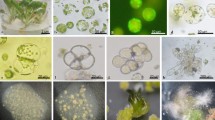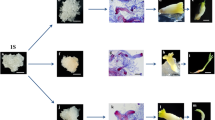Abstract
Phytosulfokines (PSK) belong to a new class of peptide growth factors involved in intercellular signaling in plants. In this study, we examined the effect of PSK on cell division and subsequent adventitious shoot formation in protoplast-derived callus culture of Nicotiana benthamiana. Protoplast cultures and protoplast-derived calluses of N. benthamiana were treated with different concentrations of PSK (0, 0.01, 0.03, 0.1, 0.3, and 1 µM). Cell division efficiency was the highest at 32% in the 0.1 µM PSK treatment, which was about two times higher than that of control treatment. PSK concentrations < 0.1 µM were more effective in inducing cell division in the protoplasts than those > 0.3 µM. In contrast, higher concentrations of PSK were more effective in inducing adventitious shoot formation in protoplast-derived calluses. The frequency of adventitious shoot formation was the highest at 8.5% when the calluses were treated with 1 µM PSK. qRT-PCR analysis showed an increase in the expression of genes involved in cell division and differentiation: G1/S specific cyclin (CYCD3-1), cytokinin dependent kinase (CDK), and WUSCHEL (WUS) at 0.1 µM PSK treatment. These results indicate that PSK plays a significant role in promoting cell division and adventitious shoot formation in N. benthamiana. The results obtained in this study could be applied to promote cell division and plant regeneration in protoplast cultures of diverse recalcitrant crop plant species.






Similar content being viewed by others
Data availability
All result figures and supplementary result figures are attached in the manuscript.
References
Adamus A (2012) An alginate-layer technique for culture of Brassica oleracea L. protoplasts. In Vitro Cell Dev Biol Plant 48(2):265–273
Aghdam MS, Sayyari M, Luo Z (2020) Exogenous application of phytosulfokine α (PSKα) delays yellowing and preserves nutritional quality of broccoli florets during cold storage. Food Chem 333:127481
Aghdam MS, Ebrahimi A, Sheikh-Assadi M (2021) Phytosulfokine α (PSKα) delays senescence and reinforces SUMO1/SUMO E3 ligase SIZ1 signaling pathway in cut rose flowers (Rosa hybrida cv. Angelina). Sci Rep 11(1):23227
Amano Y, Tsubouchi H, Shinohara H, Ogawa M, Matsubayashi Y (2007) Tyrosine-sulfated glycopeptide involved in cellular proliferation and expansion in Arabidopsis. Proc Natl Acad Sci 104:18333–18338
Asif M, Eudes F, Randhawa H, Amundsen E, Spaner D (2014) Phytosulfokine alpha enhances microspore embryogenesis in both triticale and wheat. Plant Cell Tissue Organ Cult 116(1):125–130
Benson EE (2000) In vitro plant recalcitrance: an introduction. In Vitro Cell Dev Biol Plant 36:141–148
Davey MR, Anthony P, Power JB, Lowe KC (2005) Plant protoplasts: status and biotechnological perspectives. Biotechnol Adv 23(2):131–171
Eun C-H, Ko S-M, Matsubayashi Y, Sakagami Y, Kamada H (2003) Phytosulfokine-α requires auxin to stimulate carrot non-embryogenic cell proliferation. Plant Physiol Biochem 41(5):447–452
Frearson EM, Power JB, Cocking EC (1973) The isolation, culture and regeneration of Petunia leaf protoplasts. Dev Biol 33:130–137
Gamborg OL, Miller RA, Ojima K (1968) Nutrient requirement of suspension culture of soybean root cells. Exp Cell Res 50:151–158
Grzebelus E, Szklarczyk M, Gren J, Sniegowska K, Jopek M, Kacinska I, Mrozek K (2012) Phytosulfokine stimulates cell divisions in sugar beet (Beta vulgaris L.) mesophyll protoplast cultures. Plant Growth Regul 67(1):93–100
Grzebelus E, Maćkowska K, Macko-Podgórni A, Kiełkowska A, Szklarczyk M, Baranski R, Grzebelus D (2019) Application of protoplast technology to Apiaceae species. Acta Hortic 1264:931–944
Hall RD, Pedersen C, Krens FA (1993) Improvement of protoplast culture protocols for Beta vulgaris L (sugar beet). Plant Cell Rep 12(6):339–342
Hanai H, Matsuno T, Yamamoto M, Matsubayashi Y, Kobayashi T, Kamada H, Sakagami Y (2000) A secreted peptide growth factor, phytosulfokine, acting as a stimulatory factor of carrot somatic embryo formation. Plant Cell Physiol 41:27–32
Huttner WB (1982) Sulphation of tyrosine residues: a widespread modification of proteins. Nature 299:273–276
Igarashi D, Tsuda K, Katagiri F (2012) The peptide growth factor, phytosulfokine, attenuates pattern-triggered immunity. Plant J 71:194–204
Igasaki T, Akashi N, Ujino-Ihara T, Matsubayashi Y, Sakagami Y, Shinohara K (2003) Phytosulfokine stimulates somatic embryogenesis in Cryptomeria japonica. Plant Cell Physiol 44:1412–1416
Jeong YY, Lee HY, Kim SW, Noh YS, Seo PJ (2021) Optimization of protoplast regeneration in the model plant Arabidopsis thaliana. Plant Methods 17(1):1–16
Kiełkowska A, Adamus A (2017) Early studies on the effect of peptide growth factor phytosulfokine-α on Brassica oleracea var. capitata L protoplasts. Acta Soc Bot Pol Pol Tow Bot 86(3):3558
Kiełkowska A, Adamus A (2019) Peptide growth factor phytosulfokine-α stimulates cell divisions and enhances regeneration from B. oleracea var. capitata L. protoplast culture. J Plant Growth Regul 38(3):931–944
Kim BJ, Gibson DM, Shuler ML (2006) Effect of the plant peptide regulator, phytosulfokine-α, on the growth and taxol production from Taxus sp. suspension cultures. Biotechnol Bioeng 95(1):8–14
Kou X, Liu Q, Sun Y, Wang P, Zhang S, Wu J (2020) The peptide PbrPSK2 from phytosulfokine family induces reactive oxygen species (ROS) production to regulate pear pollen tube growth. Front Plant Sci 11:601993
Kutschmar A, Rzewuski G, Stührwohldt N, Beemster GTS, Inze D, Sauter M (2009) PSK-α promotes root growth in Arabidopsis. New Phytol 181(4):820–831
Mackowska K, Jarosz A, Grzebelus E (2014) Plant regeneration from leaf-derived protoplasts within the Daucus genus: effect of different conditions in alginate embedding and phytosulfokine application. Plant Cell Tissue Organ Cult 117(2):241–252
Matsubayashi Y (2011) Post-translational modifications in secreted peptide hormones in plants. Plant Cell Physiol 52(1):5–13
Matsubayashi Y, Sakagami Y (1996) Phytosulfokine, sulfated peptides that induce the proliferation of single mesophyll cells of Asparagus officinalis L. Proc Natl Acad Sci U S A 93:7623–7627
Matsubayashi Y, Sakagami Y (1998) Effects of the medium ammonium-nitrate ratio on competence for Asparagus cell division induced by phytosulfokine-α. Plant Cell Rep 11(5):368–372
Matsubayashi Y, Takagi L, Sakagami Y (1997) Pytosulfokine-α, a sulfated pentapeptide, stimulates the proliferation of rice cells by means of specific high- and low-affinity binding sites. Proc Natl Acad Sci USA 94:13357–13362
Matsuzaki Y, Ogawa-Ohnishi M, Mori A, Matsubayashi Y (2010) Secreted peptide signals required for maintenance of root stem cell niche in Arabidopsis. Science 329:1065–1067
Moore KL (2009) Protein tyrosine sulfation: a critical posttranslation modification in plants and animals. Proc Natl Acad Sci U S A 106(35):14741–14742
Motose H, Iwamoto K, Endo S, Demura T, Sakagami Y, Matsubayashi Y, Moore KL, Fukuda H (2009) Involvement of phytosulfokine in the attenuation of stress response during the transdifferentiation of Zinnia mesophyll cells into tracheary elements. Plant Physiol 150:437–447
Murashige T, Skoog FA (1962) A revised medium for rapid growth and bioassays with tobacco tissue cultures. Physiol Plant 15:473–497
Mustafa NR, De Winter W, Van Iren F, Verpoorte R (2011) Initiation, growth and cryopreservation of plant cell suspension cultures. Nat Protoc 6(6):715–742
Nakayama T, Shinohara H, Tanaka M, Baba K, Ogawa-Ohnishi M, Matsubayashi Y (2017) A peptide hormone required for Casparian strip diffusion barrier formation in Arabidopsis roots. Science 355(6322):284–286
Ochatt S, Conreux C, Moussa Mcolo R, Despierre G, Magnin-Robert J-B, Raffiot B (2018) Phytosulfokine-alpha, an enhancer of in vitro regeneration competence in recalcitrant legumes. Plant Cell, Tissue Organ Cult 135(2):189–201
Patel N, Mohd-Radzman NA, Corcilius L, Crossett B, Connolly A, Cordwell SJ, Ivanovici A, Taylor K, Williams J, Binos S, Mariani M, Payne RJ, Djordjevic MA (2018) Diverse peptide hormones affecting root growth identified in the Medicago truncatula secreted peptidome. Mol Cell Proteomics 17(1):160–174
Reichardt S, Piepho H-P, Stintzi A, Schaller A (2020) Peptide signaling for drought-induced tomato flower drop. Science 377(6485):1482–1485
Ryan CA, Pearce G (2001) Polypeptide hormones. Plant Physiol 125(1):65–68
Sasaki K, Ishise T, Shimomura K, Kobayashi T, Matsubayashi Y, Sakagami Y, Umetsu H, Kamada H (2002) Effects of phytosulfokine-α on growth and tropane alkaloid production in transformed roots of Atropa belladonna. Plant Growth Regul 36(1):87–90
Shinohara H (2021) Root meristem growth factor RGF, a sulfated peptide hormone in plants. Peptides 142:170556
Sizolwenkosi, Mlotshwa Zhiyong, Yang YunJu, Kim Xuemei, Chen (2006) Floral patterning defects induced by Arabidopsis. APETALA2 and microRNA172 expression in Nicotiana benthamiana. Plant Molecular Biology 61(4-5) 781–793. https://doi.org/10.1007/s11103-006-0049-0
Stuhrwohldt N, Dahlke RI, Steffens B, Johnson A, Sauter M (2011) Phytosulfokine-α controls hypocotyl length and cell expansion in Arabidopsis thaliana through phytosulfokine receptor 1. PLoS ONE 6(6):e21054
Stuhrwohldt N, Dahlke R, Kutschmar A, Peng X, Sun M-X, Sauter M (2015) Phytosulfokine peptide signaling controls pollen tube growth and funicular pollen tube guidance in Arabidopsis thaliana. Physiologia Plant 153(4):643–653
Umehara M, Ogita S, Sasamoto H, Eun C-H, Matsubayashi Y, Sakagami Y, Kamada H (2005) Two stimulatory effects of the peptidyl growth factor phytosulfokine during somatic embryogenesis in Japanese larch (Larix leptolepis Gordon). Plant Sci 169(5):901–907
Wang C, Yu H, Zhang Z, Yu L, Xu X, Hong Z, Luo L (2015) Phytosulfokine is involved in positive regulation of Lotus japonicus nodulation. Mol Plant Microbe Interact 28(8):847–855
Wu H, Zheng R, Hao Z, Meng Y, Weng Y, Zhou X, Zhu L, Hu X, Wang G, Shi J, Chen J (2019) Cunninghamia lanceolata PSK peptide hormone genes promote primary root growth and adventitious root formation. Plants (basel) 8(11):520
Xu M, Du Q, Tian C, Wang Y, Jiao Y (2021) Stochastic gene expression drives mesophyll protoplast regeneration. Sci Adv 7(33):8466
Yamakawa S, Sakuta C, Matsubayashi Y, Sakagami Y, Kamada H, Satoh S (1998) The promotive effects of a peptidyl plant growth factor, phytosulfokine-α, on the formation of adventitious roots and expression of a gene for a root-specific cystatin in cucumber hypocotyls. J Plant Res 111(3):453–458
Yang G, Shen S, Kobayashi T, Matsubayashi Y, Sakagami Y, Kamada H (1999) Stimulatory effects of a novel peptidyl plant growth factor, phytosulfokine-α, on the adventitious bud formation from callus of Antirrhinum majus. Plant Biotechnol 16(3):231–234
Yang H, Matsubayashi Y, Hanai H, Nakamura K, Sakagami Y (2000) Molecular cloning and characterization of OsPSK, a gene encoding a precursor for phytosulfokine-α, required for rice cell proliferation. Plant Mol Biol 635:635–647
Yang H, Matsubayashi Y, Nakamura K, Sakagami Y (2001) Diversity of Arabidopsis genes encoding precursors for phytosulfokine, a peptide growth factor. Plant Physiol 127:842–851
Yang F, Xia X-R, Ke X, Ye J, Zhu L-H (2020) Somatic embryogenesis in slash pine (Pinus elliottii Engelm): improving initiation of embryogenic tissues and maturation of somatic embryos. Plant Cell Tissue Organ Cult 143(1):159–171
Zhang H, Hu Z, Lei C, Zheng C, Wang J, Shao S, Li X, Xia X, Cai X, Zhou J, Zhou Y, Yu J, Foyer CH, Shi K (2018) A plant phytosulfokine peptide initiates auxin-dependent immunity through cytosolic Ca2+ signaling in tomato. Plant Cell 30:652–667
Acknowledgements
This work was supported by the Korea Research Institute of Bioscience and Biotechnology (KRIBB) Research Initiative Program (KGM 5282223) and New Breeding Technologies Development Program (Project No. PJ01653001), Rural Development Administration, Republic of Korea.
Author information
Authors and Affiliations
Corresponding author
Additional information
Publisher's Note
Springer Nature remains neutral with regard to jurisdictional claims in published maps and institutional affiliations.
Supplementary Information
Below is the link to the electronic supplementary material.

11816_2022_805_MOESM1_ESM.jpg
Supplementary Figure1. Effect of PSK and KCLO3 on cell division from mesophyll protoplasts in protoplast culture medium. In comparison to PSK and KCLO3 combinatory treatment, the frequency of cell division from KCLO3 alone treatment was decreased after 1 week of culture. After 2 weeks of incubation, sustained cell division was observed in KCLO3 alone treatment. Scale bars represent 100 µm (JPG 799 KB)

11816_2022_805_MOESM2_ESM.jpg
Supplementary Figure 2 Effect of PSK on cell division from mesophyll protoplasts in protoplast culture medium in the absence of plant growth regulators. After 1 week of culture, mesophyll protoplasts could not divide in the protoplast culture medium without plant growth regulators. Cell elongation and budding was observed in the 0.1 µM PSK treatment, but cell division did not occur even when the incubation period was increased. Scale bars represent 100 µm (JPG 835 KB)
Rights and permissions
Springer Nature or its licensor (e.g. a society or other partner) holds exclusive rights to this article under a publishing agreement with the author(s) or other rightsholder(s); author self-archiving of the accepted manuscript version of this article is solely governed by the terms of such publishing agreement and applicable law.
About this article
Cite this article
Joo, S.J., Choi, S.H., Jie, E.Y. et al. Phytosulfokine promotes cell division in protoplast culture and adventitious shoot formation in protoplast-derived calluses of Nicotiana benthamiana. Plant Biotechnol Rep 16, 633–643 (2022). https://doi.org/10.1007/s11816-022-00805-6
Received:
Revised:
Accepted:
Published:
Issue Date:
DOI: https://doi.org/10.1007/s11816-022-00805-6




